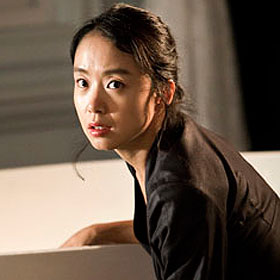The Housemaid

3.5/5
In this stirring erotic thriller, social grace and swanky marble floors are no obstacle to the coercive power of sex and revenge – dangerous themes that traditionally lend themselves to kitschy excess. But director Im Sang-soo manages to find a balance between exploiting his operatic subject matter for all the dramatic carnage it’s worth and deftly flirting with satire when our tolerance, our willingness to believe, reaches a breaking point – a feat that would have fallen flat without the support of a tremendously talented cast. However, the full potential of The Housemaid is sabotaged by its shocking and highly dissatisfying ending: concluding with a flourish so heavy handed, the delicate cadence that carried us through is spoiled like burnt crème brûlée.
While I never saw the original film, as I understand it the characterization of the housemaid was somewhat different. Rather than the innocent housemaid, Eun-yi, who is good at babysitting precisely because she is so childlike, in the 1960 version the housemaid was far more predatory, more akin to a femme fatale character than anything else. In the original, a horror film, the middle class family came to fear the housemaid as a malicious intruder. But in the remake, an erotic thriller, the ultra-wealthy family has become corrupted by their power, and the housemaid is nothing more than a delightful pain that, through devious machinations, they must squash. And so when the women of the house – the mother, the grandmother, and the elder housemaid – begin spinning webs around Eun-yi, we find ourselves rooting for her and struck with pangs of sympathy when she proves inept in the face of seasoned plotters. All in all, though this rebirth bears a resemblance of plot and setting, it shares little in spirit with its predecessor.
As the genre might imply, sexuality is a dominant theme in this film. Hoon, the moneymaking husband, is a man “who sees something he wants and gets it.” His latest fancy: the new housemaid. He is obvious in his pursuit, casting a winning grin at her, a knowing gaze. For her part, Eun-yi appears coy in her innocence, as though she’s oblivious as to what comes next, but in her youth she cannot help radiating sensuality, egging Hoon on without ever intending. Their skewed power dynamic exploits our budding sympathy for Eun-yi, and we fear for the moment when Hoon will make his move, we fear for Eun-yi’s impending loss of her innocence.
It is that sympathy, however, that brings such excitement at discovering Eun-yi’s unexpected darker side. When the confrontation finally occurs, when Hoon descends into the basement shirtless and a bit drunk, rape seems imminent. We expect a show of childlike weakness from Eun-yi, of passive submission: we expect her world to be shattered – but it is not. Instead, she rises to the occasion: she is expectant, eager. Relief overwhelms the audience – a director smiles at his success. Because by manipulating the approach, by fine-tuning the audience’s perspective coming into the sexual encounter, the director has avoided a cinematic trope (one that is present in the original film) that condemns women’s sexuality, that positions sexuality active women as succubae. If we’d been aware of Eun-yi’s sexual maturity from the outset, if that had been her dominant characteristic, it is likely we would have labeled her a predator. Instead, the combination of her good-natured innocence, the fact she is “pure of heart,” and her alluring sexual maturity allows the audience to applaud her – a woman’s – sexuality, which refreshing in an age where ladies’ men are still cool but a sexually active women is considered morally circumspect.
This encounter happens perhaps midway through, and except for an even more heated repeat incident, is the most dramatically tense moment in the film – which, though it does occur a bit early, is not necessarily a problem. That’s because sorting through the resulting imbroglio, watching as the film’s squirming characters vie for power is absorbing, enthralling even. It has its own highs and lows. Even better, it’s in the second half that the film really begins exploring the meat of its characters – how the world-weary elder maid finds new life in rebelling against principles of loyalty, family and sacrifice, how Eun-yi is pushed into darkness by others’ manipulation, and how the child of the house, Nami, a charmingly precocious cherub, is forced to choose sides.
For some reason, however, this character development wasn’t enough for Im Sang-soo. It seems he wants the high point of drama to occur at the end; his film cannot end with a whimper, it must be a bang. And so he includes a distasteful coda that completely backfires. And it backfires because it is so conclusive.
A significant source of pleasure in the film stemmed from the constant ambivalence of genre, the flirtation between melodrama and satire. In its refusal to commit to one or the other, the film made the viewer uneasy in a way that made the more ridiculous moments of the film difficult to dismiss – because how can you dismiss a scene when you not sure in which way to condemn it? Once given an answer to that question, however, as Im Sang-soo does in his indulgent ending, we are freed from that ambivalence. Which turns out, unfortunately, to be an unhappy freedom, indeed.
RELATED ARTICLES
Get the most-revealing celebrity conversations with the uInterview podcast!





Leave a comment